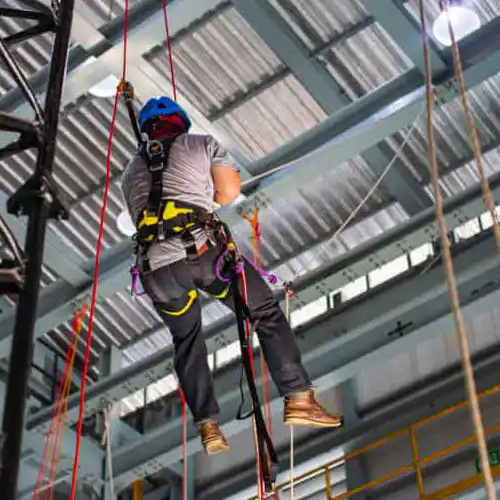OSHA’s #6 Most Cited Violation of 2025: Fall Protection – Training Requirements (1926.503)
This violation highlights a common theme: even when companies provide equipment, workers often aren’t trained to use it safely or can’t prove that training occurred.

Why Training Still Falls Short — and How to Close the Gap
Falls continue to be the leading cause of fatalities in construction, and insufficient training remains a top contributor. In FY 2025, OSHA issued 1,907 citations under 1926.503, ranking Fall Protection Training Requirements at #6 — with 143 fewer violations than 2024.
Where OSHA Finds Problems
1. Training Is Missing or Outdated
-
No record of initial training
-
Training materials not specific to the site or tasks
-
No refresher training after policy or equipment changes
-
Subcontractors working under different standards
OSHA requires that each employee who might be exposed to fall hazards receives formal instruction and hands-on practice.
2. Training Is Not Documented
Even if workers are trained, missing documentation is one of the most common citations.
Employers must keep written records showing:
-
Date of training
-
Topics covered
-
Trainer credentials
-
Employee sign-offs
3. Competent Person Not Involved
OSHA defines a competent person as someone capable of identifying existing and predictable hazards and authorized to take corrective action.
Training that lacks this supervision is not compliant.
4. Improper Equipment Use
Workers may have harnesses but don’t know how to:
-
Inspect for damage
-
Connect to an anchorage
-
Adjust D-rings and leg straps
-
Select the right lanyard or SRL
This leads to misuse and serious falls from otherwise protected heights.
5. Failure to Retrain After Incidents
Refresher training is required whenever OSHA notes unsafe practices or after a fall occurs.
Many companies skip this step — and the citations show it.
How to Stay Compliant with 1926.503 in 2025
✔ Create a Documented Training Program
Include site-specific hazards, hands-on demos, and written tests.
Store sign-in sheets and trainer certifications electronically for easy retrieval.
✔ Train on Real Equipment
Use the exact harnesses, lanyards, and SRLs employees will wear.
Classroom training alone is not enough.
✔ Designate a Competent Person
They should supervise training, evaluate performance, and verify hazard controls daily.
✔ Refresh Annually or After Changes
Whenever new systems, equipment, or procedures are introduced, provide updated training.
✔ Audit and Verify Records
During inspections, OSHA will ask for training logs first. Keep them organized by employee and renewal date.
How Advanced Safety & Industrial Supply Can Help
At Advanced Safety & Industrial Supply, we provide end-to-end support for fall-protection compliance:
✅ Competent-person training and certification
✅ Custom fall protection programs
✅ Onsite audits and mock OSHA inspections
✅ PPE sourcing for harnesses, lanyards, and anchorage systems
✅ Refresher training for crews and supervisors
Related ASI Product Categories & Brands
Let our team help your facility reduce citations, prevent accidents, and protect your workforce.
Call (615) 739-3278 or Contact Us now to schedule training or an onsite evaluation.
















